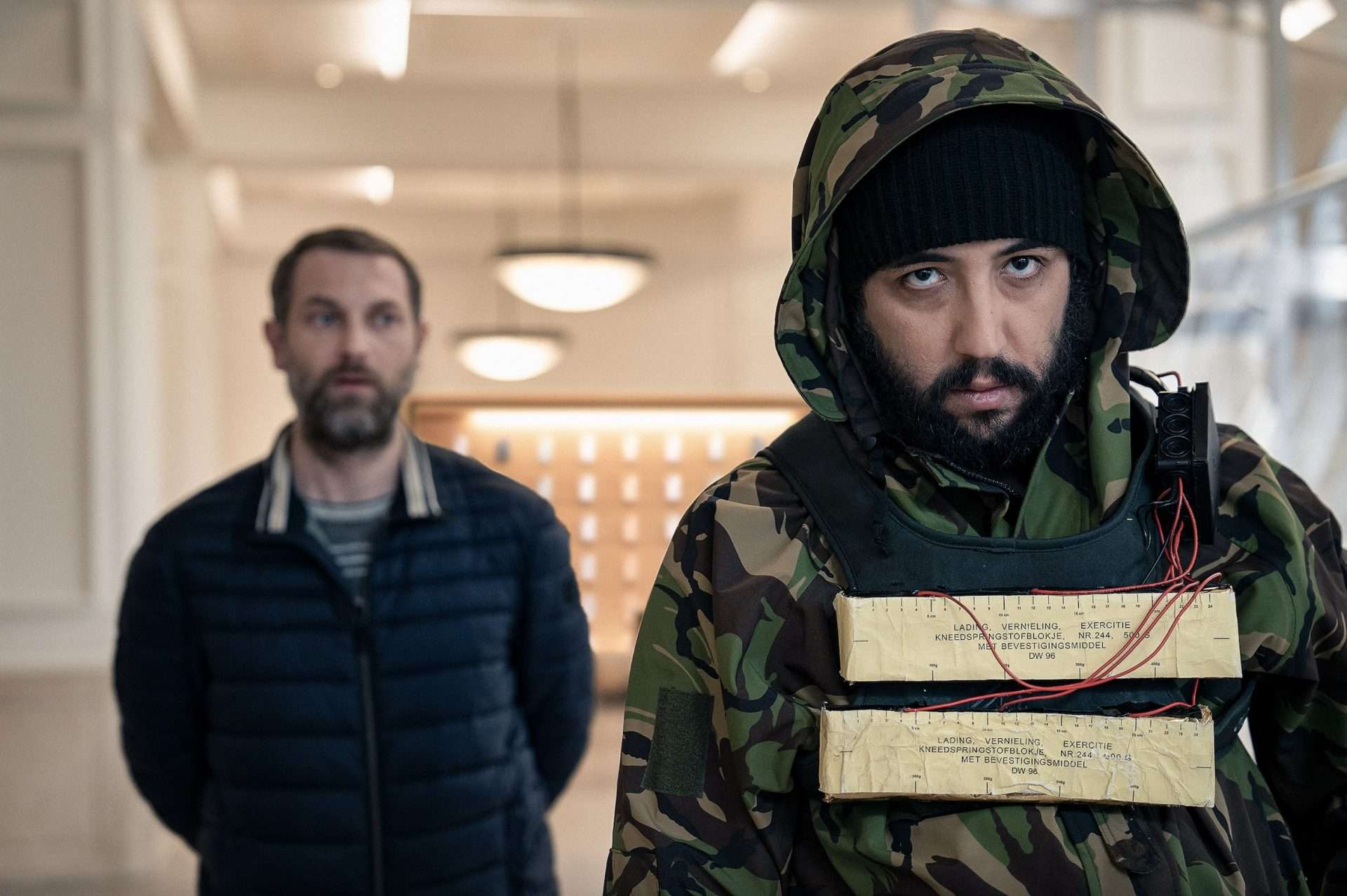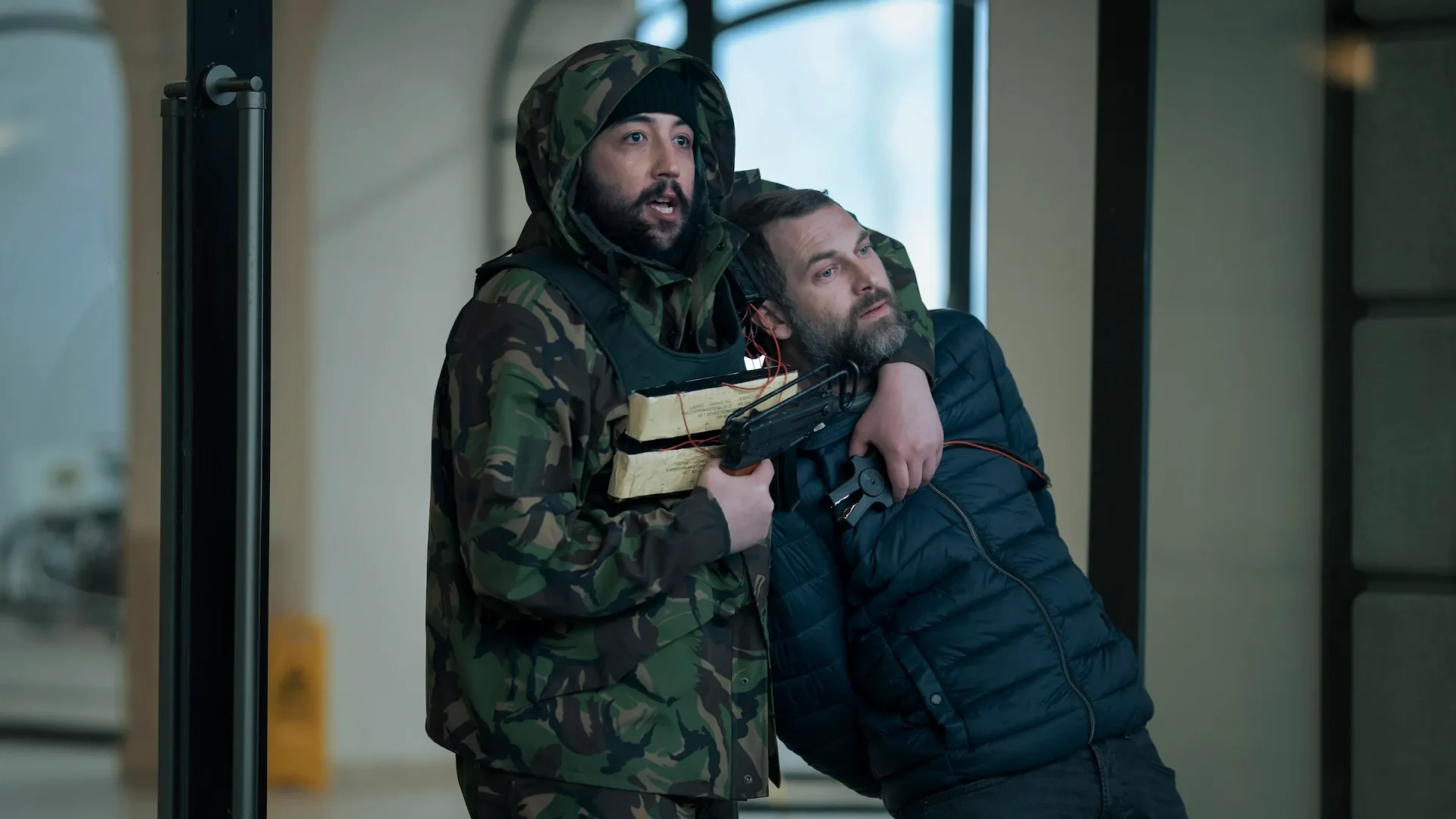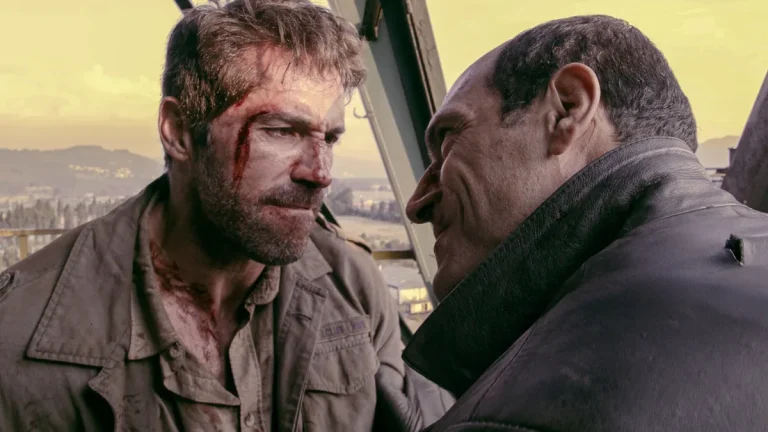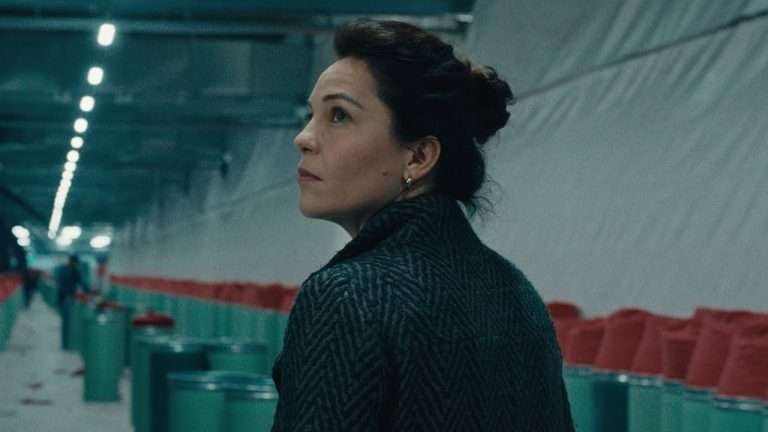iHostage (2025) is more than just a gripping thriller—it’s a profound exploration of the psychological and emotional aftermath of a real-life hostage crisis. The film delves into the lingering shadows of trauma, following the intertwined journeys of its three central figures: Ilian, the direct victim struggling to reclaim a sense of normalcy; Mingus, the quiet hero who acted selflessly in the face of fear; and Winston, the duty-bound officer burdened by the weight of responsibility. Rather than focusing solely on survival, iHostage asks a deeper question—what does it truly mean to live in the wake of terror?
Spoilers Ahead
iHostage (2025) Plot Summary and Movie Synopsis:
How is the Relationship between Ilian and his Wife?
Ilian clearly values his connection with his wife. Even though he has just arrived in Amsterdam after a tiring journey, he takes her call without hesitation. Despite the inconvenience of having to use speakerphone, he doesn’t postpone the conversation. This suggests a certain level of respect and emotional closeness. The couple shares important updates, especially regarding finances, indicating that they still make decisions together and try to support each other.
However, the tone shifts when the topic of money arises. The couple is under financial pressure, and Ilian is visibly concerned when he learns that his wife has arranged a large sum for an apartment deposit. His confusion is not just about logistics; it stems from fear. He worries that she might have taken unethical steps to gather the money. This shows a crack in the trust between them. Ilian doesn’t confront her directly, but the suspicion lingers in his mind.
Although he chooses not to dwell on his doubts and carries on with his day, the inner conflict remains. This choice reflects his effort to maintain peace and keep love intact, but also hints at emotional fatigue. In essence, Ilian and his wife share a relationship built on affection but strained by financial instability and a growing sense of mistrust.
What Happens inside the Apple Store?
Ilian enters the Apple Store with a simple goal: to replace his lost AirPods. He follows the usual procedure, speaks to a clerk, and is redirected to another as per store protocol. His actions are calm and routine, reflecting a man trying to regain normalcy before attending to his professional duties. At the same time, other customers engage in their own errands. Lukas waits for a diagnosis on his MacBook, which turns out to need a battery replacement. Nearby, a mother and daughter seek help with purchasing a new phone, though they are visibly frustrated by the lack of available staff. The scene reflects everyday life, people dealing with technical issues, making purchases, and experiencing minor annoyances.
Ilian successfully buys his AirPods and is preparing to leave when everything changes. A man in a dark jacket and hoodie enters. His behavior quickly raises suspicion, prompting the store greeter to approach him. This is when the situation escalates. The man draws a gun and demands that everyone remain inside. As gunshots ring out, panic spreads. Most customers flee before the assailant fully takes control. However, Ilian is not quick enough. He ends up as the only visible hostage. The gunman doesn’t seem interested in robbery, his motive appears more personal or ideological.

Unseen by the attacker, clerk Mingus acts fast. He hides Lukas, the mother, and daughter inside a digitally locked closet, saving their lives. However, he remains inside, now an unseen hostage himself. In total, over 70 people, including those upstairs, are caught in this hostage crisis. The gunman has a plan and wants to be heard. What begins as an ordinary store visit has turned into a life-threatening standoff driven by deeper intentions.
Why is Lynn Taken Off the Case?
Lynn is assigned as the lead negotiator after the hostage-taker, Ammar Ajar, contacts the police directly and demands someone to speak with. She steps into a tense, high-stakes situation and manages to make significant progress. Her calm, professional approach encourages Ammar to reveal personal details, including his real name and the motivations behind his violent act. He expresses deep resentment toward the system: government, police, and society at large, and demands a massive ransom along with safe passage.
Lynn proves skilled at breaking into Ammar’s psyche. Her methods reveal his emotional state, his sense of injustice, and his desire for recognition. However, despite her efforts, she cannot push him toward surrender. The situation remains fragile and dangerous, made worse by the presence of explosives and the pressure of public safety.
The turning point comes when Ammar spots the laser from a sniper rifle aimed at him. This moment destroys any remaining trust. Ammar sees it as a betrayal, a sign that the police are not taking his demands seriously. Though Lynn has no role in the sniper’s decision, she is the face of the negotiation. Ammar, already unstable and driven by paranoia, blames her for the move.
Following this, Ammar explicitly demands that Lynn be replaced with a male negotiator. His request is not based on logic but on bias and mistrust. The authorities comply, not because Lynn fails professionally, but to prevent further escalation and protect the hostages. In the end, Lynn is taken off the case not due to incompetence, but due to a dangerous combination of tactical error and the hostage-taker’s sexist bias.
What does Mingus do?
Mingus, an employee at the Apple Store, acts with quick thinking and calmness during a life-threatening crisis. His actions reflect courage, intelligence, and deep responsibility toward others. When the gunman, Ammar, takes over the store, Mingus reacts instantly. He pulls three customers: Lukas, a mother, and her daughter, into a digitally locked closet. This quick decision prevents them from being noticed by Ammar. Hiding them not only keeps them physically safe but also helps prevent the situation from spiraling further out of control.
While in hiding, Mingus does not stay passive. He contacts the police and provides valuable information. His knowledge of the store’s layout proves vital. Using his directions, the police are able to plan a discreet route and rescue the 70 civilians trapped on the upper floors. Mingus ensures that none of this triggers suspicion from Ammar, showing how well he handles extreme stress.
His heroism continues when one of the people in the closet falls sick. Mingus once again contacts the police, who connect him with a medical expert. The woman is having a panic attack, not a heart attack, and Mingus follows instructions to calm her down. His response prevents further panic and helps maintain order. Even when instructed by the police to lie down to avoid possible crossfire, Mingus manages to keep everyone calm. He becomes the quiet leader of a small group, shielding them from fear and confusion. Mingus shows that heroism isn’t always loud or violent. His presence of mind, empathy, and swift decisions protect lives and earn him respect from the police and the public alike.
What is Ammar’s Real Motive?
“iHostage” does not provide a clear explanation for Ammar’s drastic actions, but several hints help us understand his mindset. Ammar is portrayed not as a simple criminal, but as a man crushed under the weight of a broken system. His motive seems rooted in financial ruin, social isolation, and psychological distress. Ammar works as a delivery truck driver. He claims to have been mistreated by government institutions, the police, and society at large. This suggests a growing bitterness toward a system he believes has failed him. His demand for 200 million euros in Bitcoin and safe passage shows not just greed, but desperation—a desire to take back control.

However, unlike a typical terrorist, Ammar never harms anyone directly. He provides water when asked and remains cooperative to an extent. His bomb jacket turns out to be fake, hinting that his goal might not have been mass destruction, but rather attention; a final, dramatic act to make people listen. The situation turns when Ilian pretends to struggle while picking up water bottles. Ammar bends down, puts his gun aside, and unknowingly creates an opening. Ilian escapes and runs toward the police. Ammar follows, but a tactical vehicle hits him to prevent a risky shooting. He is knocked out and taken to the hospital, only to die the next day from his injuries.
Although “iHostage” is based on real events, it doesn’t commit to a definite explanation for Ammar’s actions. The film leaves his backstory open-ended, perhaps intentionally, forcing viewers to confront the gray zones of moral judgment. Was Ammar a villain or a victim? The film doesn’t say. It invites us to consider how desperation, neglect, and systemic failure can push a man over the edge. Ilian survives the ordeal without major harm and is seen receiving medical care. His bravery contributes to ending the crisis. Along with Mingus and the other hostages, he is rescued, and no civilian lives are lost. In the end, Ammar dies with his true intentions unknown, and Ilian lives on, perhaps with questions that can never be fully answered.
iHostage (2025) Movie Ending Explained:
“iHostage” focuses not only on the resolution of the crisis but also on the emotional aftermath experienced by the hostages. While all hostages are rescued without physical harm, their psychological scars run deep. Ilian, who becomes Ammar’s primary hostage, faces the most intense trauma. For nearly a full day, he is at the mercy of a volatile man threatening to kill him or blow up the store. Even after his clever escape, Ilian’s emotional damage lingers. In the final scene, he listens to his favorite song through the AirPods he had wanted to buy, now a symbol of the traumatic event.
How do the Hostages React to the Situation When It is All Over?
He breaks down, no longer able to suppress the grief and fear he endured. This moment shows that while the danger is over, the psychological weight of the experience is just beginning. Ilian will now carry a changed perspective on life, relationships, and even trivial and simple objects. Mingus, the Apple Store employee who hides himself and three customers inside a closet, plays a pivotal role in keeping them safe.
He remains calm under pressure, avoids triggering Ammar, and communicates with the police without causing panic among the others. But after the hostages are rescued, Mingus finally allows himself to feel. Inside a police car, away from the others, he breaks down, showing the toll the crisis has taken. His earlier restraint was not a lack of emotion, but a conscious choice to protect others, solidifying his role as a silent hero.
The three customers Mingus hides are saved without Ammar ever discovering them. Thanks to Mingus’s courage and quick thinking, they avoided confrontation. Their emotional journeys are not explored deeply in the film, but it is implied that their safety comes at the cost of intense fear and helplessness.
Winston, a DSI officer, responds to the emergency even while off duty. He leaves his family mid-highway to join the operation. Eventually, he makes the bold decision to ram Ammar with a car, ending the crisis without triggering the fake bomb. Though his action breaks protocol, an investigation later deems it lawful. He is not prosecuted. Winston reunites with his family, but unlike the civilians, he must continue facing such dangers in his profession. His emotional burden is unspoken but constant.



![A Simple Favor [2018] Review: A Cocktail with Flavor](https://79468c92.delivery.rocketcdn.me/wp-content/uploads/2018/09/a-simple-favor-2018.jpg)
![Creed [2015]: The Discreet Charm of Balboa](https://79468c92.delivery.rocketcdn.me/wp-content/uploads/2015/11/635712555627482823-XXX-CREED-SNEAKPEEK-MOV02-DCB-74168496.jpg)

